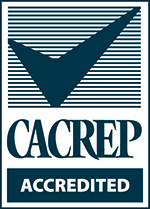CACREP-Accredited
Students in their final semester are eligible to sit for the National Counselor Exam (NCE)
Hands-on Experience
Growing Edges Community Counseling Clinic
A clinic on campus that is the only program of its kind in Pennsylvania’s State System of Higher Education
92% Job Placement Rate
Within 6 months of graduation
The Department of Counselor Education teaches the knowledge and skills necessary for the professional practice of counseling and college student affairs work. As one of the oldest established counseling departments in the nation with three CACREP-accredited concentrations, the curricula enhances students’ academic, personal, and career potential through a comprehensive counselor education program, which boasts a 92% job placement within six months of graduation.
The counseling program is a careful balance of theory with practice. The department has established numerous sites for experiential learning, including elementary and secondary schools, colleges and universities, public and private social service agencies, correctional facilities, and hospitals.

Students in our CACREP-accredited programs who are in their last semester of coursework are eligible to sit for the National Counselor Exam (NCE), a national standardized test administered by the National Board of Certified Counselors (NBCC). Upon successful passing of the NCE, students are eligible to use the Nationally Certified Counselor (NCC) credential. Passing the NCE (or NCMHCE), earning a 60-hour master’s degree in counseling, and accruing 3000 hours of post-masters supervised practice provides graduates with the necessary education and training to apply for licensure as a professional counselor (LPC).
Admissions Requirements
In addition to the application and transcript(s), applicants to programs within the Department of Counselor Education must submit:
- Resume
- Three (3) recommendations
- References should come from current or former instructors/professors, current or former university staff-members (e.g. Dean of students), or employment supervisors.
- If you have been out of school for an extended time and those university faculty and staff who you would ask are now retired, obtain a recommendation from a current or former work supervisor.
- Related Experience Form
- We would like to hear about all your experiences (paid or volunteer), particularly as your experience relates to the counseling concentration for which you are applying. Form is located within the online application.
- Counseling Autobiographical Statement
- Length: Not to exceed five (5) pages (double‐spaced; 12‐point font)
- Content: We would like to know something about who you are, why you are interested in this degree, what you plan to do with this degree and what pieces of your life you would like to grow.
- Format: In five pages or less, you are to produce an autobiographical statement that gives us a sense of you (past, present and future). Please include each of the following construct areas as major headings in your paper:
- Why are you pursuing this degree?
- How do you plan to use this degree in the future?
- What will you bring to the program (personally and/or professionally)?
- Describe your characteristics that make you effective in working with people.
- Describe your characteristics that you feel you need to develop to work more effectively with people.
- How do you best learn complexities of the world; especially those that contradict previous knowledge?
- Describe personal/professional experiences with individuals who differ from you in regard to race, ethnicity, culture, gender, gender identity, gender expression, sex, sexual orientation, religion or spiritual beliefs.
- NOTE: It is both wise and critical that you distinguish your responses to each of the prompts above by using examples and specific information. General statements, e.g., I am a really good listener, that are not supported by specific examples will detract from your overall application evaluation.
- Evaluation: We are using your autobiographical statement to assess both your match with the program/field and your writing skills. Pay attention to style, grammar, punctuation, wording and flow.
- Upload the statement through your online application portal.
School Counseling applicants are required per PA Department of Education requirements to have a 3.0 cumulative GPA at the time of application. If your current GPA is below 3.0, please consider applying for an alternate specialization within the Department of Counselor Education. Once your cumulative GPA rises above a 3.0, students can then transfer into the School Counseling track.
Counseling has rolling admissions with no application deadline. Students can begin the program during the spring, summer, or fall terms. Once the application is complete, the Counseling Department will begin the review process and make a prompt decision.
Take the Next Step
Course Work for Clinical Mental Health Counseling Concentration, MS
Courses are organized into three phases and should be taken in that order. The sequence within each phase should be followed as closely as possible. Consultation with an advisor on a regular basis is required as a student progresses through the program. Students must apply for admission to candidacy the semester they are enrolled in Practicum. This degree requires a minimum of 60 Credits. For complete course descriptions, please visit the catalog.
Course Work for College Counseling and Student Affairs Concentration, MS
Courses are organized into three phases and should be taken in that order. The sequence within each phase should be followed as closely as possible. Consultation with an advisor on a regular basis is required as a student progresses through the program. This degree requires a minimum of 60 Credits. For complete course descriptions, please visit the catalog.
You will complete a practicum and two internships as part of your clinical development. We have a variety of approved sites for experiential learning throughout central Pennsylvania and surrounding areas. The program teaches the skills necessary for the professional practice of clinical mental health counseling. Our emphasis on personal growth encourages development in an understanding of values and beliefs which enhances and facilitates the helping process.

